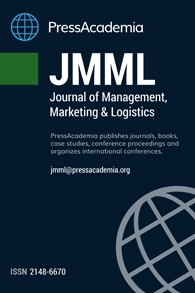THEORETICAL JOURNEY OF TALENT MANAGEMENT: EGALITARIAN AND ELITIST APPROACH
THEORETICAL JOURNEY OF TALENT MANAGEMENT: EGALITARIAN AND ELITIST APPROACH
Talent, Talent management Strategic Human Resource Management, Egalitarian and Elitist Approach,
___
- Al Ariss, A., Cascio, W. F., & Paauwe, J. 2014, ‘‘Talent management: Current theories and future research directions’’ Journal of World Business, Vol.49, pp.173-179.
- Axelrod, B., Handfield-Jones, H. and Welsh, T., 2001, ‘‘War for talent’’, part two. McKinsey Quarterly, Vol. 2, pp.9–11.
- Barney, J. 1986, ‘‘Organizational culture: Can it be a source of sustained competitive advantage?’’, Academy of Management Review. Vol.11, No.3, pp.656-665.
- Beechler, S., & Woodward, I. C. 2009, ‘‘The global war for talent’’, Journal of International Management, Vol.15, No.3, pp. 273-285. Becker, G. 1964, ‘‘Human Capital’’, Chicago: The University of Chicago Press. Björkman, I., Ehrnrooth, M., Mäkelä, K., Smale, A., and Sumelius, J. 2013, ‘‘Talent Or Not? Employee Reactions To Talent Identification’’, Human Resource Management, Vol. 52, No.2, pp. 195–214
- Chuai, X., Preece, D., & Iles, P. 2008, ‘‘Is talent management just "old wine in new bottles"?’’, Management Research Review, Vol.31, No.12, pp.901-911.
- Collings, D. G., & Mellahi, K. 2009, ‘‘Strategic talent management: A review and research agenda’’, Human Resource Management Review, Vol.19, No.4, pp.304.
- Cropanzano, R., & Mitchell, M. 2005, ‘‘Social exchange theory: An interdisciplinary review’’, Journal of Management, Vol.31, No.6, pp.874.
- Eisenberger R., Fasolo P., and Davis-LaMastro, V. 1990, ‘‘Perceived Organizational Support and Employee Diligence, Commitment, and Innovation’’, Vol.75, No.1, pp.51-59.
- Farndale, E., Scullion, H., & Sparrow, P. 2010, ‘‘The role of the corporate HR function in global talent management’’, Journal of World Business, Vol.45, No.2, pp.161.
- Festing, M., Schafer, L. and Scullion, H. 2013,‘‘Talent management in medium-sized German companies: an explorative study and agenda for future research’’, The International Journal of Human Resource Management, Vol.24, No.9, pp.1872–1893.
- Festinger, L. 1957, ‘‘A Theory of cognitive dissonance’’, Stanford, CA: Stanford University Press.
- Françoys G. 2004, ‘‘Transforming gifts into talents: the DMGT as a developmental theory’’, High Ability Studies, Vol.15, No.2, pp.119-147. Gelens, J., Dries, N., Hofmans, J., & Pepermans, R. 2013, ‘‘The role of perceived organizational justice in shaping talent management outcomes: A research agenda’’, Human Resource Management Review, Vol.23, No.4, pp.341-353.
- Hoglund M., 2012, ‘‘Quid pro quo? Examining talent management through the lens of psychological contracts’’, Personnel Review, Vol.41, No.2, pp.126-142.
- Ingham J. 2006, "Closing the talent management gap: Harnessing your employees’ talent to deliver optimum business performance", Strategic HR Review, Vol.5, No.3, pp.20 – 23.
- Lawler, E. E., & Worley, C. G. 2006, ‘‘Built to change: How to achieve sustained organizational effectiveness’’, San Francisco, CA: JosseyBass.
- Lesley U. 2007, "From talent compliance to talent commitment: Moving beyond the hype of talent management to realizing the benefits", Strategic HR Review, Vol.6, No.3, pp.32 – 35.
- Lewis, R. E., & Heckman, R. J. 2006, ‘‘Talent management: A critical review’’, Human Resource Management Review, Vol.16, No.2, pp.139.
- McDonnell, A. 2011, ‘‘Still Fighting the "War for Talent"? Bridging the Science Versus Practice Gap’’, Journal of Business and Psychology, Vol.26, No.2, pp.169-173.
- Mellahi, K., & Collings, D. G. 2010, ‘‘The barriers to effective global talent management: The example of corporate élites in MNEs’’, Journal of World Business, Vol.45, No.2, p.143.
- Michaels, E., Handfield-Jones, H., & Axelrod, B. 2001, ‘‘The war for talent’’ Boston: Harvard Business School Press. Moczydłowska, J. 2012, ‘‘Talent management: theory and practice of management. the polish experience’’, International Journal of Bussiness Economic Research, Vol.3, No.1, pp.432-438.
- Shen, J., Chanda, A., D'Netto, B., & Monga, M. 2009, ‘‘Managing diversity through human resource management: an international perspective and conceptual framework’’, The International Journal of Human Resource Management, Vol.20, pp.235-251.
- Petkovic M., Dordevic B. 2013, ‘‘Global Talent Management as A Factor Of Multinational Companies'’, Competitiveness Economic Themes, Vol. 51, No.4, p791.
- Sparrow, P. R. and Makram, H., 2015, ‘‘What is the value of talent management? : building value-driven processes within a talent management architecture’’, Human resource management review, Vol. 25, No.3, pp.249-263.
- Tansley, C , and Sempik, A. 2008, ‘‘Talent Management: Design, Implementation and Evaluation’’, London: CIPD.
- Tarique, I., & Schuler, R. S. 2010, ‘‘Global talent management: Literature review, integrative framework, and suggestions for further research’’, Journal of World Business, Vol.45, No.2, pp.122-133.
- Thibaut, J. & Waiker, L. 1975, ‘‘Procedural justice: A psychological analysis’’. Hillsdale. N.J.: Erlbaum.
- Wilson, M. D., 2015, ‘‘A Qualitative Case Study Of The Talent Management Process Across Project-Oriented Companies Within The Intellect Industry’’, A Dissertation Presented in Partial Fulfillment Of the Requirements for the Degree Doctor of Philosophy, Capella University.
- Yayın Aralığı: Yılda 4 Sayı
- Başlangıç: 2014
- Yayıncı: PressAcademia
Hatice Genc KAVAS, Mehmet Celal GULTEKİN, Omer Fazil EMEK
AN ANALYSIS OF LOGISTICS VILLAGES IN TURKEY: HALKALI AND YENICE
WORD OF MOUTH MARKETING: AN EMPIRICAL INVESTIGATION IN HEALTHCARE SERVICES
Cengiz DURAN, Aysel Cetindere FİLİZ, Arzu CETİNDERE, Suleyman TİRYAKİ
ANALYZING THE EFFECTS OF PERSONALITY TRAITS ON MOTIVATIONS FOR USING SOCIAL MEDIA
Mutlu Yuksel AVCİLAR, Banu Kulter DEMİRGUNES
COMPETITION ANALYSIS OF CONSUMER ELECTRONICS RETAILING NETWORKS IN TURKEY
Aykan CANDEMİR, Erhan ZALLUOGLU, Cihat KARSLİ, Asli DİYADİN
THEORETICAL JOURNEY OF TALENT MANAGEMENT: EGALITARIAN AND ELITIST APPROACH
